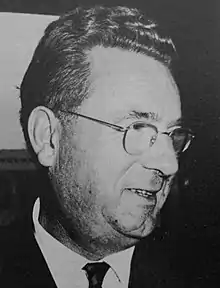Filip Bajković
Filip Bajković was the President of the Executive Council of Montenegro from 16 December 1951 to 12 July 1962. From 12 July 1962 to 5 May 1963, he was the President of the People's Assembly of Montenegro.
Filip Bajković | |
|---|---|
 | |
| 2nd Prime Minister of Montenegro | |
| In office 16 December 1951 – 12 July 1962 | |
| Preceded by | Blažo Jovanović |
| Succeeded by | Đorđije Pajković |
| Personal details | |
| Born | 20 May 1910 Cairo, Khedivate of Egypt |
| Died | 15 February 1985 (aged 74) Belgrade, SR Serbia |
| Political party | Communist Party of Yugoslavia |
Biography
He was born on May 20, 1910, in Cairo, Egypt, where his father served him. Soon he and his family came to the Kingdom of Montenegro, where in the citizens of Cetinje, his father's native village, he finished elementary school. Then he enrolled in high school he finished school in 1929/1930. in Cetinje. By nationality is Montenegrin, peasant social background. He spent his childhood in very difficult material conditions, separated from his father, who returned to Cairo after the First Balkan War, in which he participated as a volunteer, and in 1922. He died there. As a high school student, especially in the older gymnasium classes, he actively participated in the work of the literary family "Skerlic", and engaged in cultural, artistic and sporting activities.
In the autumn of 1930, he enrolled at the Faculty of Law in Belgrade. A few months later, due to difficult material circumstances, he was employed in the administration of the magazine "Misao", where he worked for several years and took exams at the Law Faculty. Arriving in Belgrade he approached the advanced student youth and joined the Yugoslav socialist movement. In 1932 . He was admitted to the membership of the Communist Party of Yugoslavia (CPY). Two years later he was sent to party work at Karaburma where he formed a party organization in the textile factory Vlade Ilic and was elected secretary of the meat sports club "Belgrade".
In 1935, during the break-up of a party organization in the country, Karaburma organization was also discovered, and Filip Bajkovic was arrested and sentenced to one year of strict imprisonment, which he spent in Sremska Mitrovica and Nis. Upon leaving the prison, he was sent to serve military service, when he passed two residual exams at the Faculty of Law. Since 1938 . until April 1941 . In the year 1939 he worked as a lawyer trainee in Belgrade. He was arrested again for his communist activity.
Fascist attack on Yugoslavia in April 1941, he found him in Belgrade, and the capitulation of the Yugoslav army in Montenegro. As a member of the Local Committee of the CPY Bar, he participated in preparations for the uprising, as well as in the uprising in the bar. In September 1941, he was elected a member of the Municipal Committee of the CPY of Cetinje, and a month later as a member of the Bureau of the District Committee of the CPY of Cetinje. February 1942. he became Secretary of the National Liberation Committee for the District of Cetinje, and two months later deputy political commissar of the Lovcen Partisan Detachment. He remained in office until the formation of the Fourth Montenegrin Proletarian Brigadein which he assumed the post of Deputy Political Commissioner of the 5th Battalion.[1]
At the end of 1942 he was transferred to the First Proletarian Brigade for the head of the Politodel Brigade, and in the second half of 1943. He was appointed as instructors of the Central Committee of the CPY for party schools in units and on the terrain of Dalmatia and Bosnia . In the middle of 1944. He joined the UN in Yugoslavia for the year. Later on, while fighting for the liberation of Belgrade took place, he participated in the organization of the UN for Vojvodina.
After the liberation he continued to work in the UN and Yugoslavia, which is 1948. He received the rank of general-general and duty as Assistant Minister of Personnel Affairs. April 1951 . In the meantime, he was transferred to Montenegro, where in the meantime until 1963. He performed the following duties:
Chairman of the Chamber of Commerce Deputy Prime Minister of Montenegro President of the Executive Council of the Assembly of the People's Republic of Montenegro of 16 December 1953 . until 12 July 1962 . years President of the Assembly of the National Assembly of Montenegro from 12 July 1962 to 5 May 1963 In the same period, starting in 1953, he was a member of the Parliament of Montenegro and the Federal People's Assembly and a member of the Politburo of the Central Committee of the Montenegrin CP.
From 1963, he held office in Belgrade:
Federal Secretary for Industry Member of the Federal Executive Council Vice President of the Federal Assembly Member of the Federation Council since 1970 . years He died on February 15, 1985 . in Belgrade . He was buried on February 17 in Civic people near Cetinje.
The holder of the Partisan Medal in 1941, and other foreign and Yugoslav awards, including the Order of National Liberation, Order of the Yugoslav flag and others. The Order of the People's Hero was decorated on November 27, 1953 . years.[2]
References
- Народни хероји 1982, p. 53.
- "Montenegro". World Statesmen. Retrieved 2011-02-06.
| Preceded by Blažo Jovanović |
President of the Executive Council of Montenegro 16 December 1951–12 July 1962 |
Succeeded by Đorđije Pajković |
| Preceded by Blažo Jovanović |
President of the People's Assembly of Montenegro 12 July 1962–5 May 1963 |
Succeeded by Andrija Mugoša |
